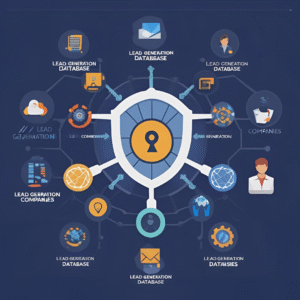Lead generation is super important for any business. It’s how companies find new people who might want to buy their products or services. Imagine you have a cool new toy. You need to tell people about it so they can buy it, right? Lead generation is just like that. But instead of shouting from the rooftops, businesses use smart tools. One very useful tool is a lead generation database. These databases are like big phone books, but for businesses. They have information about many potential customers. This article will explain what these companies do and why they are so helpful.
A lead generation database company collects and organizes information. They gather details about individuals or other businesses. This information can include names, email addresses, phone numbers, and even what companies they work for. Then, they sell access to this organized data. Businesses can use this data to find new customers. It helps them reach out to the right people.
How Lead Generation Database Companies Help
These companies act like a bridge. They connect phone list with possible buyers. They are experts at finding people who are likely to be interested. This helps businesses get more views for their products. Also, it opens doors to new groups of people. This means more chances to make sales.
Lead generation database companies often have huge lists of potential customers. These lists cover many different industries. They also include various places around the world. This helps businesses find new markets easily. They can reach people they might not have found alone.
What Do These Databases Contain?
A typical lead generation database has lots of details. It includes contact names and job titles. You can also find email addresses and social media profiles. Sometimes, it even has company sizes and what they earn. All this information helps businesses know who they are talking to. It lets them make their messages special for each person. This is called personalization.
For example, if you sell software to small businesses, the database can help you find small businesses. It can show you their contact details. Then, you can send them a message that talks directly to their needs. This makes it more likely they will listen.

Understanding the Process: How Data is Collected and Used
Lead generation database companies use many ways to get their information. They might get data from public sources. They also use special tools that search the internet. Some even have people who check the information. This helps make sure the data is correct.
They also categorize this information carefully. This makes it easy for businesses to find exactly who they need. For instance, you can search for companies in a certain city. You can also look for people with specific job titles. This careful sorting saves businesses a lot of time. They do not have to search for each contact themselves.
The Importance of Good Data Quality
Having correct and fresh data is super important. Think about it. If you have an old phone number, you cannot call someone. The same is true for lead generation. If the data is wrong, your efforts will be wasted. Good lead generation database companies work hard to keep their data accurate.
They regularly check and update contact information. This stops businesses from contacting old or wrong leads. They also make sure the data is complete. This means all the important boxes are filled in. Also, they keep the data in a neat and standard way. This stops mistakes and confusion.
Integration with Other Tools
Many lead generation databases work with other it did not identify the suspect business tools. For example, they can connect with Customer Relationship Management (CRM) systems. CRM tools help businesses keep track of their customers. When a database links with a CRM, new leads automatically go into the system.
This saves time because no one needs to type in the information by hand. It also means the sales team always has the newest data. They can quickly follow up on new opportunities. This makes the whole process smoother and faster.
Benefits of Using a Lead Generation Database
There are many good reasons to use these databases. Firstly, they help businesses get more sales. By finding people who are truly interested, businesses sell more. This helps them make more money.
Secondly, these databases help businesses save money. Traditional advertising can be very expensive. But with a database, you target only the people who are likely to buy. This means you spend your money more wisely. You get more for what you pay.
Increased Brand Awareness
Lead generation campaigns also make more list provider people know about your brand. When you reach out to new potential customers, they learn about your company. Even if they don’t buy right away, they remember your name. This helps your brand grow bigger and stronger over time.
Furthermore, you get to understand your customers better. The data in these databases gives you clues about what people like. You can see their job roles, their companies, and sometimes even their interests. This helps you create better products and services. It also helps you talk to them in a way they understand.
Building Long-Term Relationships
Using lead generation databases is not just about quick sales. It helps build lasting relationships. When you talk to someone who is a good fit, you start a conversation. Over time, this can build trust. Trust is very important in business. It leads to loyal customers who come back again and again. They might even tell their friends about you.
This kind of steady growth is very valuable. It makes your business strong for the future. You are not just chasing one sale. Instead, you are building a community of happy customers.
Key Features to Look For
When choosing a lead generation database, look for certain things. First, check the data accuracy. You want a company that keeps its information fresh. Next, consider how large their database is. More contacts mean more chances to find good leads.
Also, think about the filtering options. Can you search for specific job titles? Can you find companies in certain industries? Good filters help you find the best leads quickly. Finally, see if it connects with your other tools. Easy connections make your work much simpler.
Different Types of Databases
There are different kinds of lead generation databases. Some focus on businesses, called B2B (business-to-business). They have information about other companies and their employees. Others focus on individual consumers, called B2C (business-to-consumer). They have details about regular people.
Some popular B2B databases include ZoomInfo, Lead411, and Apollo.io. These tools are often used by sales teams. They help find decision-makers in other companies. LinkedIn Sales Navigator is also a very strong tool for finding business contacts. It uses the large network of LinkedIn.
Cost of Lead Generation Databases
The cost of these databases can change a lot. It depends on the size of your business and what you need. Small businesses might pay less. Larger companies often need more features. They will usually pay more.
Some companies charge per lead. Others have monthly or yearly fees. It’s important to compare prices. You should also think about what you get for the money. A good database can save you a lot of time and help you earn more. This makes it a smart investment.
The Future of Lead Generation Databases
The world of finding new customers is always changing. Technology is making things even better. Artificial Intelligence (AI) is a big part of this. AI can help find leads more accurately. It can also help make messages even more personal.
Also, data privacy is becoming very important. People care more about their personal information. Lead generation database companies must follow strict rules. They need to be very careful with the data they collect. This builds trust with both businesses and individuals.
Key Trends to Watch
One big trend is “intent-based” lead generation. This means finding people who are showing signs that they want to buy. For example, if someone searches a lot for “new running shoes,” they probably want new running shoes. AI helps spot these clues.
Another trend is Account-Based Marketing (ABM). Instead of trying to reach many people, ABM focuses on a few very important companies. Lead generation databases help find all the right people within those companies. This makes marketing very focused and powerful.
